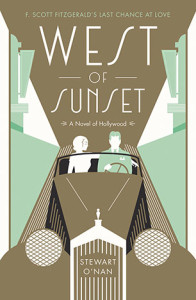Allen and Unwin, RRP$29.99
June 2015
 Ever find that you read one book about an era, event or group of people, and are then bombarded with a multitude of other books centred on the same theme. For me, I am never sure whether my book trends are actual publishing trends or mere coincidences. I suspect my current trend of books about the Jazz Age—more specifically the leading couple of that age, Zelda and F. Scott Fitzgerald—is an actual publishing trend. It definitely feels like one, right?
Ever find that you read one book about an era, event or group of people, and are then bombarded with a multitude of other books centred on the same theme. For me, I am never sure whether my book trends are actual publishing trends or mere coincidences. I suspect my current trend of books about the Jazz Age—more specifically the leading couple of that age, Zelda and F. Scott Fitzgerald—is an actual publishing trend. It definitely feels like one, right?
The latest book to come into my radar—and the more tricky part of the equation for me: be read—was Stewart O’Nan’s West of Sunset, a biographical novel charting the last three years of Fitzgerald’s life. In West of Sunset it is 1937, under considerable financial pressure and with Zelda institutionalised, Fitzgerald heads to Hollywood to reinvent himself as screenwriter. It is here that Fitzgerald will begin work on what is his final, posthumously published novel The Love of the Last Tycoon (originally published as The Last Tycoon), and find a new chance at love with Sheilah Graham, a Hollywood gossip columnist.
Fictional accounts of famous writers, well any type of famous artist who has had a recent resurgence in popularity, can be a bit hit and miss. Some can end up being a bit on the dry side when they are written with a too serious academic bent in mind. Others can fall down when the author idolises the artist they are fictionalising, where the portrayal becomes an uncomfortable exercise in hero-worship. Though O’Nan occasionally stumbles on the second point he thankfully does not fall at all into the first category. His portrayal of the array of famous characters that come out of the woodwork in Fitzgerald’s Hollywood is written in a crisp and vibrant style. And the energy of these star studded encounters is balanced against Fitzgerald’s internal reflections.
And where for the briefest glimmers Fitzgerald glows a little too brightly from the pages of West of Sunset the shine was swept away by the nuanced unravelling of Fitzgerald. Fitzgerald as a golden boy who can do no wrong, is quickly proven an illusion, a memory of a much younger time where drinking to excess was an amusing party trick not the essential but self-destructive survival tool it has come to play in his day-to-day life. In his attempts to merge his present with his past Fitzgerald is alone as Zelda—his once partner in crime—has become a now unrecognisable and unstable chameleon.
The backdrop of West of Sunset—the Golden Age of Hollywood—is the ultimate location for reinvention and reincarnation. In these final years Fitzgerald is himself reinvented and recreated; as screenwriter, as husband, as lover and eventually as man who, if not entirely at peace with himself, then at least has moments of peace. And Fitzgerald’s new love, Sheilah, is another one of Hollywood’s reinvented. But where Fitzgerald’s reinvention seems to be accidental and driven by necessity, Sheilah’s seems more like the modern Hollywood star creation, the carefully orchestrated character built up piece by piece. Though the romance was very much real, it was hard for me, especially early on, to be convinced of its passion—it just seemed to happen amidst the bleary drunken rambling and angst of Fitzgerald’s inner monologue. Of course in recognising this, my reading became a teeny bit focused on hunting for the clues as to how this couple worked. And I do wonder if part of the attraction between them was a recognition of each having undergone reinvention to take their place in Hollywood. Part of the tension between them was definitely that while Sheilah’s past was completely detached from her present, Fitzgerald was still awash with his past even in Hollywood.
But enough of my brains desire to unpick that which it does not immediately understand. The important question to ask is does West of Sunset—like all fictional retellings of real people and events should—manage to carry itself as a novel in its own right? Able to be read for the sheer pleasure of reading in the absence of knowledge and interest in the people and events portrayed. And the answer, for me, is yes. O’Nan’s characterisation of Fitzgerald is a nuanced image of a man well past the point of drunk and into self-destruction on legs, wallowing in his memories and regrets. He is the lead in a cast of characters well written enough to almost step out of the page as real, well, Hollywood real at least. Though the end of Fitzgerald’s story is always predestined, the novel still holds much to be discovered by its reader be they fans of Fitzgerald, the Golden Age of Hollywood, or just a reader drawn in by the particularly striking cover.

